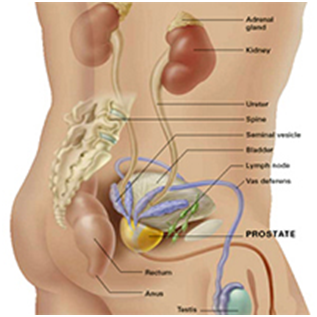Prostate cancer Diagnose & Treatment in India
Prostate is an important part of male reproductive system. Prostate Cancer is the uncontrolled growth of abnormal cells in the prostate. If left untreated, these Cancerous cells spread very rapidly to the nearby tissues and other parts of the body.
Most of the prostate Cancer cases are diagnosed in the advanced Late stage because many patients do not experience any major symptoms in the beginning. Prostate-Specific Antigen (PSA) elevation is an indicator of possible prostate Cancer.
Prostate cancer usually causes no symptoms. Few prostate cancer does cause symptoms. These include frequent urination, increased urination at night, difficulty starting and maintaining steady stream of urine, hematuria (blood in the urine), and painful urination. A study based on the 1998 Patient Care Evaluation in the US found that about a third of patients diagnosed with prostate cancer had one or more such symptoms, while two thirds had no symptoms.
Signs and symptoms
Prostate cancer that’s contained inside the prostate (called localised prostate cancer or early prostate cancer) doesn’t usually cause any symptoms. But some men might have some urinary problems. These can be mild and happen over many years and may be a sign of a benign prostate problem, rather than prostate cancer.
Changes to look out for include
Needing to urinate more often than usual, including at night – for example if you often need to go again after two hours
Difficulty starting to urinate
Straining or taking a long time to finish urinating
A weak flow when you urinate
A feeling that you’re not emptying your bladder fully
Needing to rush to the toilet – sometimes leaking before you get there
Dribbling urine after you finish.
How prostate cancer is diagnosed?
Urine tests
A urine test can be used to check whether your symptoms are caused by an infection in your urinary system, such as a kidney infection or bladder infection.
Rectal examination
You may need a rectal examination to check whether you might have prostate cancer. Prostate cancer can cause the prostate gland to become hard and bumpy.
Prostate cancer doesn’t always cause changes to the prostate gland, so you may need to have some more specialised tests to rule it out. You will probably be referred to a urologist for these tests.
Prostate-specific antigen (PSA) test
A blood test can be used to measure the amount of the PSA protein that’s produced by the prostate. A raised PSA level indicates enlargement of the prostat, and a significantly raised level may indicate prostate cancer. However, as with a rectal examination, a PSA test can’t provide a definitive diagnosis of prostate cancer.
Transrectal ultrasound (TRUS)
A TRUS is a type of ultrasound scan specifically designed to study the prostate and the surrounding area. An ultrasound probe is placed into your rectum and uses soundwaves to build a detailed image of your prostate. This type of scan measures the size of your prostate and can be used to either confirm or rule out a diagnosis of prostate cancer.
Computer tomographic (CT) urogram
A CT urogram is used to study the urinary tract (the bladder and the tubes through which urine passes, also known as the ureter and urethra). A CT urogram can be used to check for blockages in your urinary system that could be causing your symptoms, such as a kidney stone or bladder stone. It can also be used to detect any damage in the urinary tract.
Voiding charts
A voiding chart is a urination diary, which you may be asked to keep for 24 hours. You’ll be asked to record how often you urinate, as well as details about how you urinate – for example, whether your urination is stopping and starting, or whether it’s difficult to start urinating.
Uroflowmetry
Uroflowmetry measures the pressure of your bladder and how well your bladder works when you urinate. You’ll be given a local anaesthetic and a small flexible tube (catheter) will be inserted into your urethra and moved up into your bladder. Water will then be injected through the catheter and into your bladder. A computer connected to the catheter measures the pressure inside your bladder and can assess how well your bladder is working. As with voiding charts, uroflowmetry is a good way of determining what type of treatment will help to control your symptoms.
Prostate cancer diagnosis and treatment in India
You can get Prostate cancer diagnosed and treated in India at affordable cost. There are many best cancer hospitals of India. These hospitals are experts in screening, diagnosing, staging & treatment of prostate cancer.

